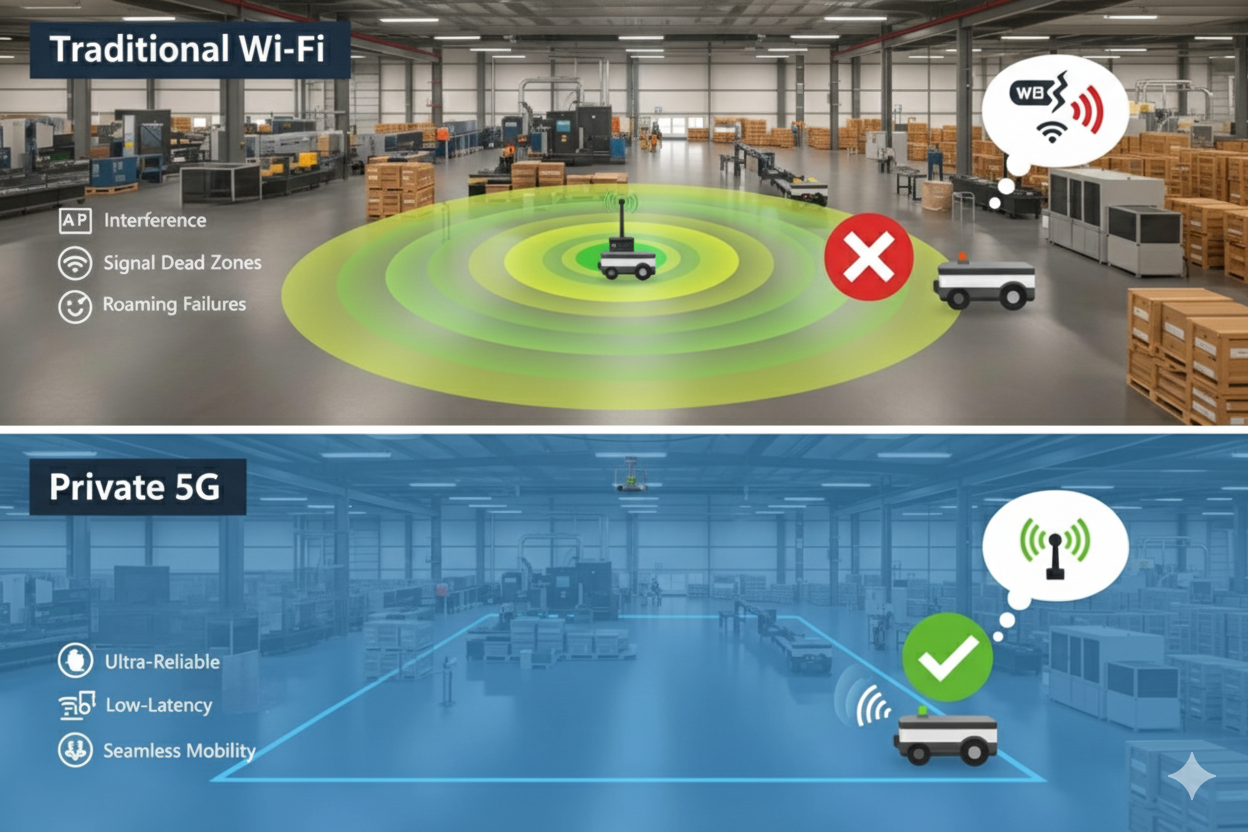October 24, 2025
.jpg)
Have you ever considered how a dedicated network could prevent a factory shutdown due to connectivity failure, protect patient lives through uninterrupted data flow in a hospital, or enable seamless learning for thousands of students on a sprawling campus? In an era where digital transformation defines success, private networks are turning these critical needs into achievable realities, fostering innovation and reliability across key sectors.
Private networks, utilizing LTE and 5G technologies alongside dedicated private network addresses, create secure, isolated environments for organizations to manage their connectivity. These systems employ private network IP addresses to ensure data remains within controlled boundaries, offering superior performance, reduced latency, and robust security compared to shared public options.
Sectors such as manufacturing, healthcare, and education encounter distinct demands that require dependable, high-performance networks. Manufacturing operations depend on seamless machine interactions to support automation and minimize disruptions. Healthcare must adhere to regulations like HIPAA while facilitating instant data exchange for patient care. Educational institutions need flexible connectivity to accommodate digital tools and hybrid learning models. Private networks meet these requirements through allocated spectrum and compatibility with systems like AWS NLB private IP for effective cloud load balancing.
The tangible effects include enhanced efficiency, automation, and overall digital transformation. Research indicates that enterprise private LTE implementations can decrease operational interruptions by up to 40 percent, as seen in various case studies. As we delve deeper, the practical applications across these industries reveal how private networks drive meaningful change.
Private 5G in manufacturing is pivotal for creating smart factories, where networks facilitate ultra-low latency for automation and robotics. This allows machines to synchronize in real time, reducing errors and increasing output. For instance, automated guided vehicles and robotic arms can adjust dynamically based on immediate data, optimizing assembly processes.
Predictive maintenance emerges as a core benefit, integrating AI and edge computing within private networks to analyze equipment conditions proactively. IoT sensors detect anomalies like vibrations or temperature shifts, predicting failures and extending asset lifespan. Studies from Siemens show reductions in unplanned downtime by up to 50 percent through such systems, directly impacting manufacturing efficiency.
IoT-enabled production monitoring further enhances visibility, with private network IP addresses securing communications among devices for inventory tracking and workflow optimization. A real-world example involves electronics manufacturers achieving 25 percent yield improvements via sensor integration. Secure private IP communication safeguards intellectual property in these settings.
Overall, these networks align with digital transformation in manufacturing, building resilient ecosystems. Organizations evaluating such systems often weigh the business case for private wireless to ensure alignment with long-term goals.

In healthcare, private networks ensure secure transmission of patient data, aligning with HIPAA compliance through encrypted channels and private network addresses. This prevents breaches while allowing seamless sharing of electronic health records.
Real-time monitoring via connected medical IoT devices is transformative, with wearables and sensors relaying vital signs over low-latency 5G for prompt alerts. In emergency settings, this facilitates quicker interventions and improved outcomes. Hospitals can link monitors across facilities, enabling remote oversight by physicians.
Remote surgeries and telehealth leverage the stability of private 5G, supporting high-definition video for robotic procedures from distant locations. An example includes rural clinics connecting to urban experts, broadening care access.
Integration of private IP and AWS NLB private IP optimizes hospital networks by distributing traffic securely, avoiding overloads in data-intensive scenarios. IoT in healthcare, bolstered by these networks, supports AI for real-time imaging analysis. These applications underscore how private networks elevate patient care with uncompromised security.
Private networks are revolutionizing education through smart campuses, incorporating IoT sensors for energy-efficient buildings and interactive digital classrooms. These systems automatically regulate lighting and HVAC based on usage, promoting sustainability and cost reductions. For instance, sensors optimize room conditions by detecting occupancy.
Managing network traffic in hybrid learning environments is essential, with private LTE delivering dedicated bandwidth for video conferencing, online materials, and collaboration tools. This maintains smooth experiences for both on-site and remote participants, free from public network delays.
Private LTE enhances connectivity for students and staff beyond classrooms, offering secure hotspots and location-based services for navigation or alerts. Universities might use it for attendance tracking via connected devices.
Cloud integration with AWS private IPs ensures efficient data handling, using NLB for load balancing during high-demand periods like assessments. Digital transformation in education personalizes learning through AI, creating adaptive, connected campuses.
Private networks deliver a range of advantages that make them indispensable in demanding environments. Here are some key benefits:
These elements position private networks as strategic investments for long-term operational success.
Performance distinguishes private vs public networks, with public Wi-Fi or cellular prone to congestion and delays. Private LTE ensures dedicated bandwidth, vital for demanding tasks like manufacturing robotics.
The key differences include:
These distinctions highlight why enterprises increasingly opt for private solutions to achieve greater control and reliability.
Deploying private networks involves several considerations that organizations must address for successful implementation. Common challenges include:
Solutions often involve collaborating with expert providers to navigate these hurdles effectively, as detailed in analyses of private cellular network costs.

Future developments will amplify AI applications in predictive analytics and automation, processing data at the edge for optimized supply chains in manufacturing or customized education.
The expansion of 5G private networks and spectrum optimization will deliver faster speeds and wider coverage, accommodating more devices and enhancing IoT + edge synergy for advanced enterprise connectivity.
AI in real-world applications will advance healthcare diagnostics and automated processes. CIOs and CTOs should evaluate infrastructure, upskill teams, and form partnerships for transitions. As technologies integrate, private networks will underpin innovation, keeping organizations agile.
Q1: What are the real-world applications of private networks in manufacturing?
Private networks support smart factory automation, predictive maintenance with AI, and IoT monitoring, resulting in reduced downtime and enhanced efficiency on production lines.
Q2: How do private network addresses improve healthcare security?
They establish isolated, encrypted pathways for data transmission, guaranteeing HIPAA compliance and shielding patient information from unauthorized entry.
Q3: Why is AWS NLB private IP important for enterprise connectivity?
It enables secure load balancing in cloud setups, efficiently managing traffic while preserving control over private IPs for dependable, high-performance networks.
Q4: How do private LTE and 5G benefit education and smart campuses?
They facilitate IoT for energy optimization, seamless hybrid learning, and secure connectivity, fostering efficient digital spaces for students and staff.
Q5: What challenges do organizations face in deploying private networks?
Major hurdles include substantial upfront costs, complexities in IP management, integration issues, and regulatory adherence, yet expert support can mitigate these.
Ready to build your private network? Empower your manufacturing plant, healthcare facility, or campus with secure, AI-driven private LTE and 5G infrastructure. Connect with our experts today to design your future-ready private network.
Why settle for unreliable public networks or costly disruptions when you can harness the power of secure, high-performance connectivity? Metro Wireless delivers tailored private LTE and 5G solutions for manufacturing plants, healthcare facilities, and educational campuses, ensuring speed, security, and scalability at a fraction of traditional carrier costs.
Empower your enterprise with AI-driven, future-ready infrastructure that meets your industry’s unique demands.
Contact Metro Wireless today to design your private network and stay ahead of the curve.

Tyler Hoffman
CEO
